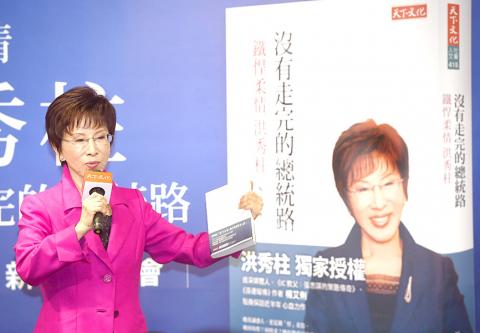Deputy Legislative Speaker Hung Hsiu-chu (洪秀柱) yesterday said that it would be a “lie” to say that she had put the controversy over her failed presidential bid completely behind her.
Speaking at the Taipei launch of her book, Unfinished Presidential Road, Hung said: “I wish the title of the book were different from what it is now. I would be lying if I said I am not sorry [over how things turned out], but I have to say I have no regrets or complaints.”
Hung was referring to the Chinese Nationalist Party’s (KMT) decision to rescind her candidacy in mid-October, almost three months after her nomination as the party’s official candidate on July 19. Citing her low poll ratings, the KMT replaced her with party Chairman Eric Chu (朱立倫).

Photo: Fang Pin-chao, Taipei Times
Hung said she had “vigorously visited different places when she was the candidate although [her] legs are short.”
“Under the young master [shaoye, 少爺], we now have a different and better fate,” she said, referring to Chu, betraying a hint of bitterness with her choice of words. “I have finished off the bitter days for him. I hope he can fare better down the road.”
Asked whether she has been invited to the opening of Chu’s campaign headquarters on Saturday, Hung said she had not yet received an invitation.
“However, that is a good day [according to the traditional calendar], so even if I am invited, I would go to those places where I am needed the most, such as the party’s legislative candidates’ rallies, as Chu’s event would certainly be crowded by heavyweights,” she said.
Hung also reiterated her cross-strait policy, saying that although it is not wrong to uphold “one China, different interpretations,” it could only maintain a fragile cross-strait relationship, but not a stable one.
“It is a pity that the idea did not have the ear of our comrades, and that is what I find the most regretful,” she said.
Hung had championed the new idea of “one China, same interpretation” during her campaign, which was also one of the reasons she was ousted, as KMT headquarters viewed it as “going against mainstream public opinion.”
She said she also found it extremely upsetting when she was discouraged by others, saying that Taiwanese are “gullible and difficult to teach,” when she was trying to promote her ideas.
“If [the saying] is true, then it all the more needs to be changed,” Hung said.

The Ministry of the Interior (MOI) is to tighten rules for candidates running for public office, requiring them to declare that they do not hold a Chinese household registration or passport, and that they possess no other foreign citizenship. The requirement was set out in a draft amendment to the Enforcement Rules of the Public Officials Election and Recall Act (公職人員選舉罷免法 ) released by the ministry on Thursday. Under the proposal, candidates would need to make the declaration when submitting their registration forms, which would be published in the official election bulletin. The move follows the removal of several elected officials who were

The Republic of China (ROC) is celebrating its 114th Double Ten National Day today, featuring military parades and a variety of performances and speeches in front of the Presidential Office in Taipei. The Taiwan Taiko Association opened the celebrations with a 100-drummer performance, including young percussionists. As per tradition, an air force Mirage 2000 fighter jet flew over the Presidential Office as a part of the performance. The Honor Guards of the ROC and its marching band also heralded in a military parade. Students from Taichung's Shin Min High School then followed with a colorful performance using floral imagery to represent Taiwan's alternate name

FOUR DESIGNATED AREAS: Notices were issued for live-fire exercises in waters south and northwest of Penghu, northeast of Keelung and west of Kaohsiung, they said The military is planning three major annual exercises across the army, navy and air force this month, with the navy’s “Hai Chiang” (海強, “Sea Strong”) drills running from today through Thursday, the Ministry of National Defense said yesterday. The Hai Chiang exercise, which is to take place in waters surrounding Taiwan, would feature P-3C Orion maritime patrol aircraft and S-70C anti-submarine helicopters, the ministry said, adding that the drills aim to bolster the nation’s offshore defensive capabilities. China has intensified military and psychological pressure against Taiwan, repeatedly sending warplanes and vessels into areas near the nation’s air defense identification zone and across

COVETED PRIZE: The US president would be a peace prize laureate should he persuade Xi Jinping to abandon military aggression against Taiwan, William Lai said US President Donald Trump should get the Nobel Peace Prize should he be able to convince Chinese President Xi Jinping (習近平) to abandon the use of force against Taiwan, President William Lai (賴清德) told a conservative US radio show and podcast in an interview. The US is Taiwan’s most important international backer, despite the absence of formal ties, but since Trump took office earlier this year he has not announced any new arms sales to the nation. Trump could meet Xi at the APEC summit in South Korea on Oct. 31 and Nov. 1. Lai, speaking on The Clay Travis and Buck Sexton